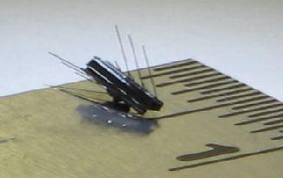This week’s lessons kicked start with a mind-blowing video on futuristic gadgets that were never thought to be possible. The future of humanity looks pretty darn good!
Moving on to the main bulk of the lesson, Prof introduced the quote which I find to be really pertinent and meaningful.
A society grows great when old men plant trees whose shade they know they shall never sit in
What this actually means is to plan to meet the needs of future generations. We need not be selfish or else the world might not be able to sustain in the long run.
To illustrate this, I would think that the area of donation to the sperm bank to maintain a large gene pool for infertile couples for example is a possible prospect we can develop. Even in the biobusiness arena, if we are able to culture micro-organisms and grow insulin for diabetes patients lives would be more fulfilling.
The idea that prof mentioned (which amazed me) was the spider web protein. Although I currently do not have the name of this technology/innovation, the spider web protein has the capabilities of providing tensile and durability on military equipment. This would be a great boon (in Singapore) to the Singapore Armed Forces. This led me to think: How could something that is seemingly thought as insignificant could serve as a revolutionary innovation? Thus the takeaway point would be to not dismiss anything in its entirety. You never know if it will be an entrepreneurial stroke of genius.
There was also the issue of metabolic syndrome, a medical disorder that increases the risk of developing cardiovascular diseases and diabetes. Sadly, this affects one in five people in the United States and prevalence increases with age. Could there be a time where the genes could be modified so that the body is immune or more resistant to such a disease? I believe it is plausibly and possibly so. Given the fact that portable dialysis pack already exists in the world today (and it has empowered diabetes patients a new lease of life and to be mobile whilst undergoing treatment), tweaking the gene is not so far-fetched after all.
This substantiates Reading 1, which is about the making of healthcare more accessible ie not just the private but also the public sector. More investment is funded for Research and Development purposes to stem out ailments ranging from diseases of access such as gout and obesity which are very possible to prevent to diseases of bandaid- a global burden of diseases like lower respiratory infections such as diarrhoea and major depression. It is also explains the vicious cycle the poor are trapped in. Without money to spend on medicine, they fall prey to diseases. Perhaps the route of the poverty cycle would be education but then again, it is always easier said than done.
We ended the day with a number of presentations. It was my turn to present this week and I showed the class my topic entitled the ViRob. In a nutshell, it is a micro-robot that serves as a mode of drug delivery (yes, in travels through your veins/bloodstreams). Although it has currently a few kinks, I’m actually looking forward to the day of its manufacture. I was initially a little reserved in using this technology given how invasive in nature it is but let’s face it. In a scenario where you’re diagnosed with say a terminal illness like cancer, would you still be bothered by how invasive a process is? I believe in this case, health comes first; the process is merely secondary.
Rating: 9/10
To conclude with a quote:
In the sick room, ten cents' worth of human understanding equals ten dollars' worth of medical science. ~Martin H. Fischer

No comments:
Post a Comment